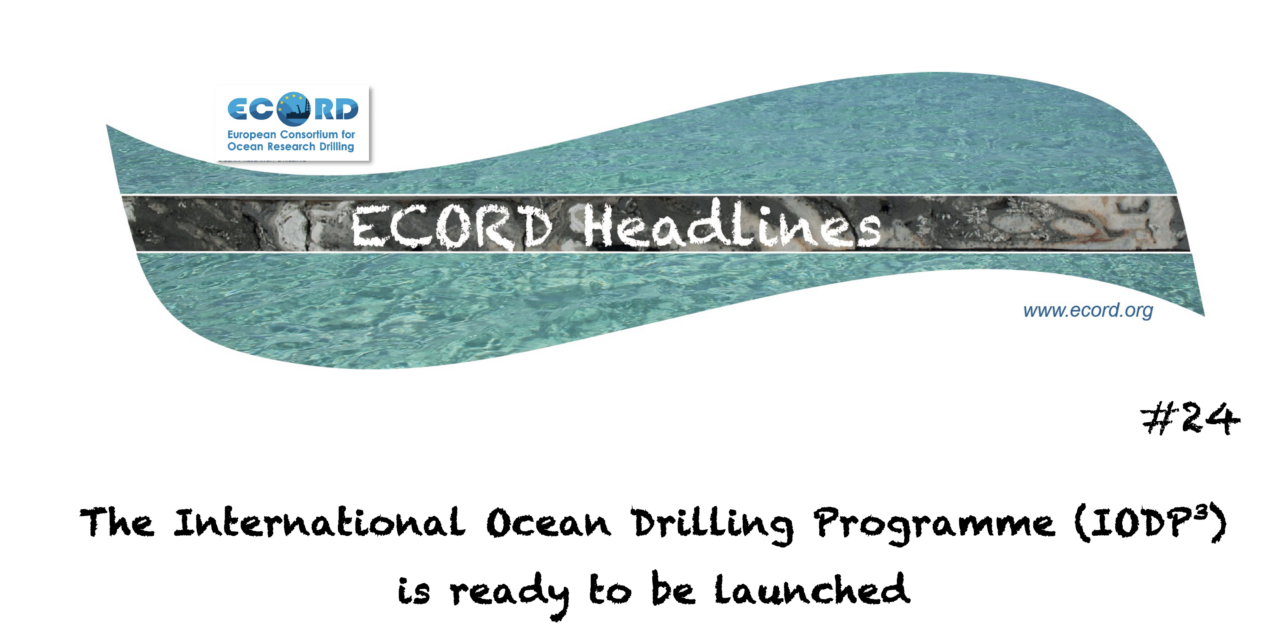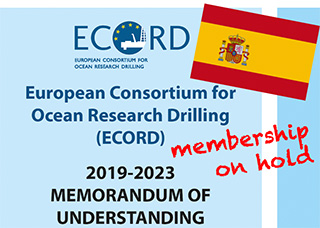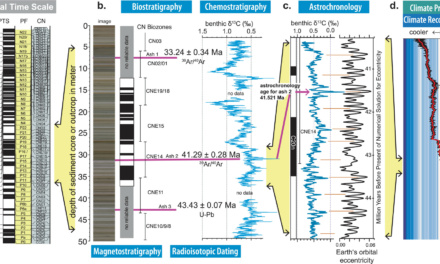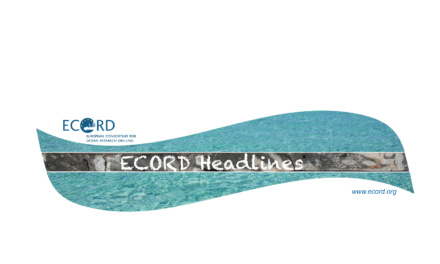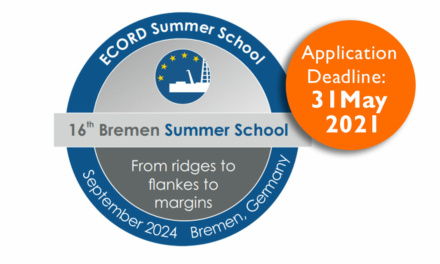Download as pdf here
Principles of the International Ocean Drilling Programme – IODP³
The end of the International Ocean Discovery Program on 30 September 2024 will mark major changes in the organization of international activities related to scientific ocean drilling. After decades of unified international programmes, from DSDP to the current IODP, post-2024 scientific ocean drilling initiatives will see a transition from a single international programme operated by independent platform providers to independent ocean drilling programmes.
ECORD and Japan, who have advocated for the continuation of a single international programme, intend to continue providing scientific ocean drilling opportunities post-2024 to the international scientific community, based on their well-established infrastructures, competitiveness in the international research landscape and maximum scientific return from investment.
Through a two-year long process of exchange of views and ambitions, ECORD and Japan agreed to build a joint scientific ocean drilling programme: the International Ocean Drilling Programme – IODP³ (IODP-cubed).
IODP³ will consist of an international scientific collaboration addressing important questions in Earth, Ocean, Environmental and Life sciences described in the 2050 Science Framework, based on the study of rock and/or sediment cores, borehole imaging, in-situ observatory data, and related geophysical imaging obtained from the subseafloor.
IODP³ will adopt a transparent, open, flexible, and international modus operandi, programme-wide standard policies and guidelines, sustainable management, and publicly accessible knowledge-based resources. IODP³ will adopt the 2050 Science Framework Enduring Principles.
Objectives and organization of the International Ocean Drilling Programme – IODP³
IODP³ investigations will be based on research proposals that address the objectives of the 2050 Science Framework, or other outstanding new research ideas.
IODP³ will implement and fund:
- Offshore expeditions following an expanded Mission Specific Platform (MSP) concept.
- Scientific Projects using Ocean Drilling ARChives (SPARCs) that are international and multidisciplinary projects that have objectives originating from or that are based on ocean drilling archives.
Drilling and SPARC proposals will be submitted with a bottom-up process to the IODP³ Science Office by teams of proponents belonging to the international research community.
The primary responsibility of the Science Evaluation Panel (SEP) is to evaluate all proposals submitted to IODP³ in a fair, open, and transparent manner, in terms of both scientific excellence and completeness and quality of the site characterization data packages. The SEP will be composed of top international experts selected through competitive calls.
The Safety and Environment Advisory (SEA) Group will be an advisory body to the MSP-FB, SEP and IODP³ Operators and will provide independent advice regarding potential safety and environmental issues associated with the general and specific geological settings of proposed IODP³ drill sites.
The SEP and the SEA Group will be logistically supported by the IODP³ Science Office and serve all the platforms employed by the programme. IODP3 drilling expeditions and SPARCs will be scheduled by the MSP Facility Board based on their scientific merit and operational constraints within the limits of the available resources.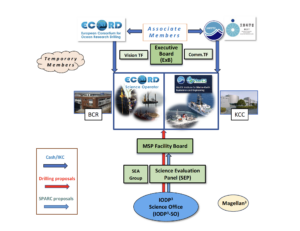
The IODP³ Executive Board (ExB) will be the IODP³ entity responsible for assuring effective decision-making and overseeing the programme.
The Magellan3 Workshops will be designed to support scientists from IODP³ and ICDP members in developing new and innovative scientific drilling proposals that meet the ambitions of the 2050 Science Framework and/or the ICDP Science Plan 2020-2030 by funding or co-funding workshop proposals and travel grants.
IODP³ will include two task forces: the Vision Task Force will be in charge of developing a long-term scientific and funding strategy and the Communication Task Force will be in charge of programme-wide communication activities.
MSP expeditions – IODP³ drilling expeditions will be implemented by the MSP Operators, ESO and/or JAMSTEC-MarE3, following the MSP concept. This concept will be an expanded Mission Specific Platform (MSP) concept by diversifying drilling and coring technologies – riserless and riser drilling, giant piston coring – and applying them to all drilling environments, as determined by scientific priorities, operational efficiency, and better value for money. D/V Chikyu and R/V Kaimei are identified as MSP facilities that are crucial facilities for the successful implementation of the 2050 Science Framework.
Land-to-Sea Transects (L2S), requiring scientific drilling at both onshore and offshore sites or at shallow marine sites to be implemented jointly with the International Scientific Continental Drilling Program (ICDP) are one of prime objectives for IODP³.
The duration of IODP³ expeditions will be flexible and be determined by scientific requirements and available funds.
IODP³ drilling expeditions will be scheduled by the MSP Facility Board based on their scientific merit and operational constraints within the limits of the available resources.
IODP³ expeditions are intended to have no significant environmental impact, and they are carried out in conformance with the highest accepted levels of environmental sensitivity.
IODP³ expeditions will be undertaken by international teams of scientists – Science Party – selected by the MSP Operator(s) and Co-chief Scientists, based on recommendations made by Program Member Offices (PMOs). Staffing decisions will consider, as far as possible, the goal of achieving the maximum diversity of gender, career stage, nationality, disciplinary, cultural in science parties.
The size of expedition Science Parties will be flexible and be determined by scientific requirements.
IODP³ will include the services provided by the current IODP core repositories in Bremen (BCR) and Kochi (KCC).
IODP³ will provide open access to all expedition samples and data once the expedition Science Party members have had the opportunity to complete the initial studies within the established moratorium period, typically one year. After the expiration of the moratorium period, the programme will make samples, cores, and data available to any scientist, in accordance with the IODP³ Samples, Data and Obligations Policy following the FAIR data principles.
Scientific Projects using Ocean Drilling ARChives (SPARCs) – The IODP³ “Scientific Projects using Ocean Drilling Archives” (SPARCs) provide a mechanism for the international scientific ocean drilling community to propose new large-scale projects that may address any aspect of the ‘2050 Science Framework’ and involving interdisciplinary collaborations.
SPARCs will have objectives that maximise the return on the legacy assets (i.e. cores, samples, and data from current and past scientific ocean drilling programmes) without new drilling or other operations at sea.
SPARCs will address globally significant processes/problems and use innovative, creative, and multidisciplinary approaches that could include, for example, the production of large new datasets from samples, integration of data across multiple expeditions and/or multiple boreholes, and/or the application of new methods or technologies (e.g., AI, “big data” approaches) that were not available when the legacy assets were collected. The scientific ambition of SPARC projects should far exceed that of standard requests for samples or data as they are intended to provide a new avenue to facilitate collaboration at scales larger than conventional single or multi-proponent sample requests. In parallel, standard requests for samples and data may be submitted at any time.
Each SPARC will have a funded duration of three years and will receive €300,000 for its implementation. SPARC proposals should have a maximum of five co-proponents. All co-proponents of a funded SPARC will automatically become Science Party members (with two selected as Co-Chief Scientists), but the remaining Science Party members will be selected following an open call for applications. The overall size of the final Science Party for a SPARC is flexible and can be adapted to project needs but will normally consist of a minimum of 15 scientists, with no fixed upper limit.
IODP³ Partnership
As Platform Providers, ECORD and Japan will be the IODP³ Core Members.
International governmental and non-governmental entities not regularly providing scientific ocean drilling platform(s) to IODP³ can become Associate Members by making annual cash contributions to IODP³ (on the order of 1 M€) or as Temporary Members by providing cash and/or project-based in-kind contributions (IKC) (with a minimum of 0.5 M€) to access IODP³ expedition(s). ANZIC and India already sent letters of interest to become IODP³ Associate Members.
IKC and/or cash contributions from any IODP³ member or non-member country/institution are potentially acceptable to fund offshore expeditions. IKCs may include essential scientific or operational services that the IODP³ would normally pay for, fully/partly funded drilling platforms, support vessels, hazard site survey (if required), permitting assistance, onshore facilities near drill sites (if required), ice management, and remote logistical assistance etc.
IODP³ will set up an overarching Scientific Drilling Forum as a venue for exchanging ideas, views and information between all international research programmes that employ scientific drilling to explore Earth and planetary processes.
Forward look
The documents that will support both the MoU/Agreement between ECORD and JAMSTEC and the organization of the whole programme and its partnership have been finalized after a retreat of the IODP³ Planning Group in September 2023 and several virtual meetings until February 2024. These documents have been sent to the CNRS and JAMSTEC legal departments who will start soon to draft the MoU/Agreement between ECORD and JAMSTEC.
Based on the well-established operation of the ECORD and JAMSTEC infrastructures, their successful implementation, their competitiveness in the international research landscape and maximum return from investment, a bright future is promised to the international communities and ECORD and Japan in their intentions to play a prominent role in post-2024 scientific ocean drilling.
Gilbert Camoin, Director of the ECORD Managing Agency,
Nobu Eguchi, Director General, MarE3, JAMSTEC
on behalf of the IODP³ Planning Group:
Gilbert Camoin – EMA, Nobu Eguchi – MarE3,
France Lagroix – ECORD Council, Gen Totani – MEXT,
Mike Webb – ECORD Council, Shin’ichi Kuramoto – JAMSTEC,
Annalisa Iadanza – ECORD Council, Nobukazu Seama – CIB,
Nadine Hallmann – EMA, Harue Masuda – J-DESC,
Angelo Camerlenghi – ESSAC, Tomo Morishita – J-DESC,
Tony Morris – ESSAC, Sanny Saito – J-DESC,
Ursula Röhl – ESO-BCR, Yuki Morono – J-DESC,
Dave McInroy – ESO-BGS, Yusuke Kubo – JAMSTEC,
Gabriele Uenzelmann-Neben – EFB, Natsumi Okutsu – MarE3,
Guido Lüniger – ECORD Council, Fumio Inagaki – JAMSTEC,
Katsuyoshi Kawaguchi – JAMSTEC, Sasha Turchyn – EFB,
Hiroyuki Tojo – JAMSTEC, Masataka Kinoshita – J-DESC,
Minoru Ikehara – J-DESC

